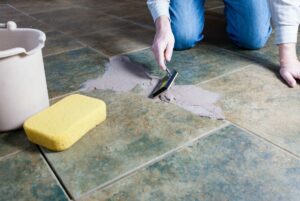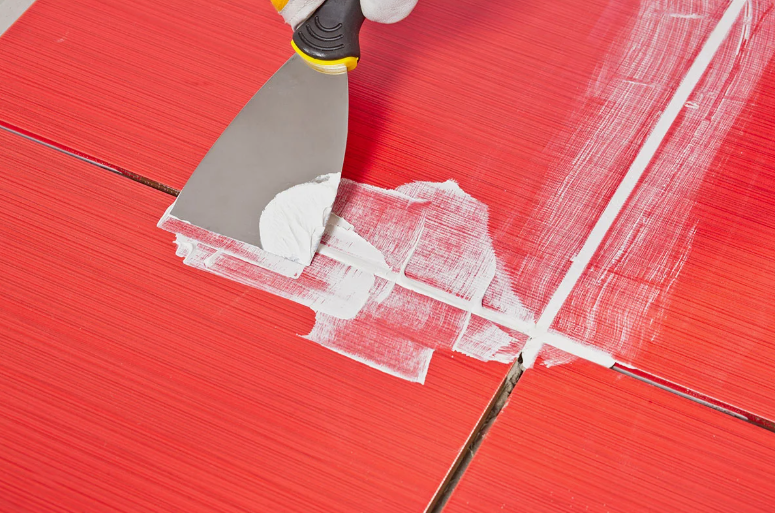Grout, that thin line of mortar between your tiles, plays a crucial role in maintaining the structural integrity and visual appeal of your tiled surfaces. Over time, however, grout can become stained, cracked, or deteriorate due to wear and tear, moisture exposure, or improper cleaning methods. When this happens, not only does the aesthetics of your floor or wall suffer, but the structural integrity of the tiles themselves can also be compromised.
This blog article will serve as your guide to effective grout repair services, providing valuable tips to ensure a successful restoration of your tiled surfaces. We’ll delve into common grout problems, the benefits of professional repair, selecting the right contractor, and the aftercare process to maintain your grout’s longevity.
Understanding Common Grout Problems
Before we explore solutions, let’s identify the telltale signs of grout problems:
- Discoloration: Grout is naturally porous and prone to absorbing stains from dirt, food spills, and harsh chemicals. Over time, this can cause the grout to appear dingy, discolored, or develop unsightly mildew.
- Cracking: Cracked grout is a more serious issue that can compromise the structural integrity of your tiles. Cracks can be caused by movement in the subfloor, improper tile installation, or shrinkage of the grout itself.
- Crumbling: If your grout is crumbling or feels soft when touched, it signifies advanced deterioration. This is often caused by moisture exposure behind the tiles due to leaky faucets, poor ventilation, or improper waterproofing.
These problems not only detract from the visual appeal of your tiled surfaces but can also lead to more significant issues like water damage, mold growth, and even structural instability.
The Advantages of Professional Grout Repair Services
While DIY grout repair solutions might seem tempting, there are several advantages to seeking professional help:
- Expertise and Experience: Professional grout repair contractors possess the knowledge and experience to diagnose the root cause of the problem and recommend the most appropriate repair solution.
- High-Quality Materials: Professionals use high-quality grout and repair materials specifically designed for durability and optimal performance.
- Proper Techniques: Applying grout requires proper technique to ensure a smooth, even finish and prevent future problems. Professionals utilize the right tools and techniques for a long-lasting repair.
- Efficiency and Time-Saving: Grout repair can be a time-consuming task. Professionals can complete the job efficiently, minimizing disruption to your daily routine.
- Peace of Mind: By hiring a professional, you gain peace of mind knowing the job is done correctly and comes with a warranty for added assurance.
Selecting the Right Grout Cleaning and Repair Service Provider
Choosing the right contractor is crucial for a successful grout repair project. Here are some key factors to consider:
- Licensing and Insurance: Ensure the contractor is licensed and insured to operate in your area. This protects you in case of any accidents or unforeseen issues during the repair process.
- Experience and Expertise: Look for a contractor with experience in handling similar projects to yours. Ask for references and before-and-after photos of their past work.
- Detailed Estimates: Obtain detailed written estimates from multiple contractors outlining the scope of work, materials to be used, labor costs, and the project timeline.
- Communication and Customer Service: Choose a contractor who is responsive to your questions and concerns and clearly explains the repair process.
- Grout cleaning and repair services offered by professional contractors can effectively address various grout issues, restoring the beauty and functionality of your tiled surfaces.
Prepping Your Home for Grout Repair
Once you’ve chosen a contractor, here’s how to prepare your home for the grout repair process:
- Clear the Workspace: Remove furniture, rugs, and other belongings from the work area to provide the contractor with unobstructed access.
- Protect Surrounding Areas: Cover countertops, cabinets, and other surfaces with drop cloths to prevent dust and debris from settling.
- Provide Ventilation: Ensure proper ventilation in the work area to facilitate drying and minimize the spread of dust particles.
By following these simple steps, you can streamline the repair process and minimize disruption to your daily life.

The Grout Repair Process: What to Expect
The specific steps involved in grout repair will vary depending on the severity of the damage. However, here’s a general overview of what to expect:
- Assessment: The contractor will thoroughly assess the extent of the grout damage and identify the underlying cause.
- Removal of Damaged Grout: Using specialized tools, the contractor will carefully remove the damaged grout. This might involve a grout saw for precise removal or oscillating tools for larger areas.
- Surface Cleaning: Once the damaged grout is removed, the contractor will thoroughly clean the underlying surface to remove any dust, debris, or loose materials. This ensures optimal adhesion for the new grout.
- Grout Selection and Mixing: The contractor will select a grout appropriate for your tile type and the intended application (floor or wall). They will then mix the grout according to the manufacturer’s instructions, ensuring the proper consistency for application.
- Grout Application: The prepared grout is then applied to the empty joints using a grout float. The contractor will skillfully fill the joints completely, ensuring a smooth and even finish.
- Grout Curing: After application, the grout needs time to cure and harden properly. The contractor will advise on the necessary waiting time before walking on the repaired area.
Additional Considerations:
- Mold Remediation: If mold growth is present in the grout, the contractor will take appropriate measures for remediation before proceeding with the repair. This might involve specialized cleaning solutions and proper ventilation.
- Color Matching: For minor repairs, matching the existing grout color might be challenging. The contractor can discuss options like staining the new grout or regrouting the entire surface for a uniform appearance.
- Sealing (Optional): In some cases, the contractor might recommend applying a grout sealer after the grout cures completely. This helps prevent future staining and simplifies cleaning.
Following Up: Aftercare Tips for Maintaining Your Grout
Once the grout repair is complete, proper aftercare is essential to ensure its longevity. Here are some tips:
- Minimize Water Exposure: Avoid excessive water exposure to the repaired area, especially during the initial curing period. Use doormats near entryways and wipe up spills promptly.
- Use Appropriate Cleaning Products: Refrain from using harsh chemicals or abrasive cleaners on the grout. Opt for gentle, pH-balanced cleaners specifically formulated for grout.
- Regular Cleaning: Maintain a regular cleaning routine for your tiled surfaces. This will help prevent dirt, grime, and soap scum buildup that can stain the grout. Consider using a grout cleaning solution periodically for deep cleaning.
By following these simple aftercare tips, you can significantly extend the lifespan of your repaired grout and maintain the beauty and functionality of your tiled surfaces.
Conclusion
Grout repair might seem like a minor task, but it plays a crucial role in maintaining the integrity and aesthetics of your tiled surfaces. By understanding the signs of grout problems, the benefits of professional repair, and the steps involved in the process, you can make informed decisions about grout care. Remember, investing in professional grout cleaning and repair services can save you money and frustration in the long run, ensuring your tiled surfaces remain beautiful and functional for years to come.

